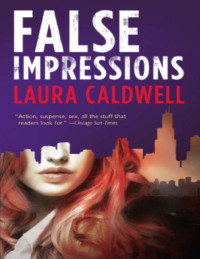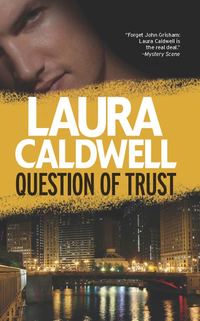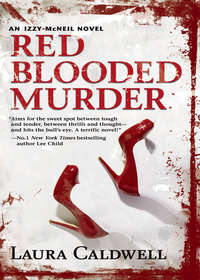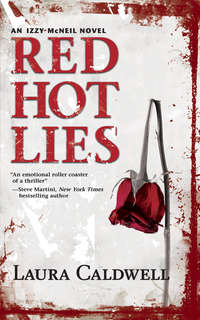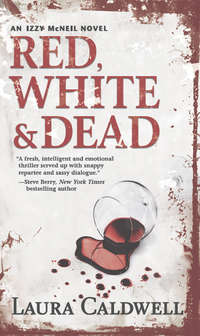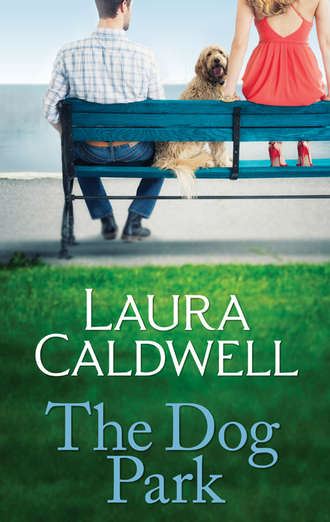
Полная версия
The Dog Park
“He’s crazy,” the guy said. “That’s a good-looking collar.”
“Right?”
“Heck, yes.”
I told him about the leash, how both had been in the video. He hadn’t seen it, so I explained the video.
He pulled it up on his phone. He laughed and laughed, then played it a second time, actually holding it out for the bullies, who sorta seemed to watch it for a bit.
“You want me to make you one?” I said, immediately wondering if I’d taken the whole bully diplomacy a little too far.
But the guy just said, “Sure! Could you do one in red and another in blue?”
“You got it.” We exchanged information. He took off the red collar of one of the bullies, and I eyeballed the size.
My phone started ringing again. I pulled it out of the pocket of my jeans. More surprise.
The screen read, Mom.
There is nothing more irritating than a person raised in a loving household, one who has been provided everything, but who finds something lacking in that setting. Nothing except being that person.
I knew this because I had always greatly disliked myself for feeling the lack of love from my parents, Simon and Muriel Champlin. They were so in love with each other that they were nearly oblivious to everyone else. It was clear how much they adored each other, and it was understandable. They were exceptional people who were exceptional together. And when two people love each other like they do, it’s an exclusive thing. They tried to spread it to me. They tried. And they did love me in their way. But I always knew I didn’t have what they did, that they couldn’t feel toward me the way they did toward each other.
So my mother and I didn’t speak with any regularity. But now she was talking quickly and excitedly. “I saw Baxter on TV!”
My parents lived out east, in a college town with a historical race course, and the only time they’d met Baxter was during a short holiday visit a year and a half ago.
“You saw it on TV or the internet?” I asked. My mother rarely watched TV.
“It just ran on our news here.”
“Are you kidding?”
“No. I turned it on to see the weather. Your father is hoping to do some work outside tomorrow.”
My parents were both artists. My father had been an urban planner first, then he became fascinated with remnants of demolished government and legal buildings. He eventually brought the materials home and retrofitted our garage to become his studio. He crafted large, avant-garde items—a huge witness stand from chunks of cement, a Doric column from cobbled shards of copper, the scales of justice from molded scrap metal. The town purchased the scales of justice to decorate the front of the courthouse. Now such pieces were all my father did, and he got paid well for them.
My mother was a completely different artist. Technically trained and meticulously detailed, her oil paintings and mixed-media pieces were delicate, lovely. But there was also something savage within them—red streaks hidden deep in a meadow, a blade in a child’s profile. My mother said she was exploring. My father, she said, had been the only person in her life to allow that exploration. It took her years, but finally a gallery in New York was interested in her. They represented her, helped create an audience for the double-edged quality of her art. She became a working artist. But she always catered to my dad, always put him first.
So now it made sense that my mother was watching the news only to check the weather for my dad, who lately took much of his work outside in decent weather.
I explained to my mother about the Baxter incident, how Vinnie shot the video and posted it, how it ran on Chicago’s morning news. And now my mother was telling me it had been shown on her local newscast.
My mother asked me about the collar and leash, and I told her I’d sewn the stars on it, told her about the sale I’d just gotten from the Labrabullies’ owner.
“Good for you! They’re gorgeous!” My parents were happiest when I was being creative, the way they were. “We have neighbors who just got two Irish setter puppies. Would you make the same collars for them? We want to give them a gift.”
“Sure, I’d love to.” It was always a treat to feel a sense of cohesiveness with one of my parents (even if only about dog accoutrements).
“Honey,” my mom said, her voice holding a little trepidation, then trailing off at the end. Finally she said, “I know this Baxter thing is fun, but is it okay? I mean are you okay?”
“I’m very okay, Mom. I’m actually great.”
“Is any of this excitement about the video bringing up past...inclinations?”
I felt a flash of irritation. “Mom,” I said in a low, strained voice. “I never had those inclinations. That’s not why it happened.”
Here was the other reason my parents and I didn’t talk often. They knew about the Amalie Project and what had led to it.
“I know,” my mother said. “You’ve told me that. But we worry.”
“Don’t!” I wanted to say, Why didn’t you worry about me when I was growing up? Why didn’t you ever worry until I was in too deep? Before I slipped away?
My mother sighed. “Okay, okay.” Silence and then she asked, “So when do you think you can have the collars done for the puppies?”
“I’ll put it at the top of my list.” I wanted to be nice to my mom. There was no reason not to be. She and my dad were who they were, never anything else. “I’ll send them within a few days.”
“Oh, take your time. Don’t put stress on yourself.”
“It’s not stress.”
“You just don’t want to get so overwhelmed that you go back to past habits.”
“Mom!”
“I’m sorry, I’m sorry.”
I took a deep breath. I asked about my dad. She gave me a quick rundown—all was good—and then she was off to find her husband.
7
The next call surprised me even more than my mom’s.
Sebastian.
He’d seen the video online, and he actually sounded a tad excited himself. Not like my mom had, but definitely amused, interested.
“Isn’t it hysterical?” I told Sebastian about Baxter darting and Vinnie shooting the whole thing.
We fell right into conversation, the way we used to a long time ago—no awkward “Hi, how ya been feeling? Okay, how about you?” chitchat.
When something like this happened—rarely, I grant you—it made me remember that when we were “us,” Sebastian and I had a hell of a lot of fun.
One of the reasons I’d shut down my online dating profile without even going on a date was because I feared that no one could be quite as fun as Sebastian when he wanted to be. And I knew fun, having been deeply involved (way too deep, it would turn out) in my teens and twenties with a touring rock band.
The problem, toward the end of us, was Sebastian hadn’t desired much fun with me. It had made me terribly wistful—remembering the days when Sebastian was on, when we were engaged. Sometimes, he would wake me at five in the morning and he would make some crazy dish—whatever he’d found at the ready-market that morning, whatever his imagination lit upon. Once, it was pretzels and scrambled eggs with cheese and hot sauce. His were the most bizarre breakfasts and the most delicious because he infused them with that fun. He brought that sense of fun to each day. He loved to “call an audible,” as he put it, hitting a last-minute Cubs game, or going to see a blues band at Kingston Mines.
But there was no such fun like that in the last year of our marriage. It was one of the factors that made me say, Okay, let’s give up.
But the conversation about our child dog was fun. “And you know it was on the news,” I told Sebastian.
“What do you mean?” He didn’t sound so amused. “Who was on the news?”
“Baxter. On Pamela’s morning show. It wasn’t just a video on the internet.”
He groaned.
“What?”
“They must have been desperate.”
“It was cute,” I said. “And then my mom called from New York. It was on their news, too.”
“Are you kidding?”
I ignored the slightly scornful tone.
“My mom called,” I repeated. I knew that would stop him. He knew I had issues with my parents that had been visited and revisited at therapists’ offices.
“Oh?” he said.
“Yeah. We had a great conversation.”
I told Sebastian about it. And maybe he was in a good mood—maybe because I’d mentioned my parents and he knew that could be a tough situation for me—because soon, he softened, I could tell. It was his tone when he responded, asked questions, it was the volume of his voice, too, that showed his level of interest. I was awarded with his full attention—questions illuminated with years of hearing about Simon and Muriel Champlin.
“How old are they now?” he said.
“Sixty-six. My mom’s sixty-five.”
“My mom’s seventy next year.” He told me of his own recent conversations with his mom. Not that his mom was anything like mine. On the contrary, she loved and adored Sebastian so much that I was pretty sure that she was secretly relieved at our divorce. That should have made me feel bitter, I suppose, but instead it only made me feel more wistful when I thought of the kind of mother’s love and adoration he got from her.
Sebastian scoffed. “I can’t believe the dog was on the news out in the sticks.”
It was the scoff that brought me back. I had heard that scoff too many times.
“What’s up, Hess?” I said, putting on a chummy tone. “You’ve got a problem with your dog being on a video?”
“Well, it’s not news.”
I wanted to bite back. But that would only start up an argument. I changed the topic, and we talked for a few minutes about nothing.
And as often happened when Sebastian and I had some kind of clash on the phone, or in this case a near clash, I took to walking around the condo, Baxter, our de facto kid, at my feet. We had spent time designing and decorating every room. The condo was our first real place together (he’d moved into mine when we were in New York). There was the joint office, and the master bedroom with the Moroccan-inspired leather headboard, the wide-planked hardwood floors we’d chosen for throughout the rest of the condo. We’d done it together. Hence, this condo was ours. I still felt like that most of the time.
But when we fought, and I walked the place, that’s when I could remind myself that this was mine now.
It took some of the sting away from Sebastian’s haughty opinions about what constituted news. I don’t know if he ever understood how much it hurt when he did that, especially back when I was working for a local magazine he considered “just a society rag—it’s a grown-up yearbook.”
That reminder rankled me, and I asked how his trip was going, just to bug him.
I got a few mumbled words in response.
“C’mon, where are you?” I asked, not because I thought he’d tell me, but more because I wanted to needle him.
“Jess,” was all he said in a tight voice.
I sighed.
I went into the kitchen with its 1950s dining chairs and the kitchen table, which had been Sebastian’s grandfather’s worktable, adorned with new legs.
“You’re back when?” I said. Another jab.
But he didn’t take the bait. “I do love you, Jess,” Sebastian said.
I waited, then muttered, “I love you, too.” Even though it didn’t matter.
We were both silent.
“Sebastian,” I said his name back to him. Not with a question mark, just said it.
At his name, Baxy seemed to have realized who I was talking with. He’d been playing with an old sock of Sebastian’s, but then his head shot up and he ran over, jumped on a kitchen chair, black nose in the air, pink tongue hanging from his mouth in a happy pant.
We fell quiet again, and in the silence of me and Sebastian, I leaned over and stroked Baxter’s neck. He stretched his head up to allow more.
Then Sebastian had to go, and I said goodbye. I’m not sure he heard me.
When I hung up, Baxter looked at me, then looked around, his eyes quickly scanning the room, darting back to me. I could hear him thinking, But where is he?
“Gone,” I said. “Gone.”
8
Sebastian returned to Chicago a week after he left. A short trip for him. He called on the way home from the airport.
“How’s Superdog?” he said when I answered.
I looked at Baxter, who sat on the checkerboard kitchen floor, patiently waiting for me to scoop his lunch into his bowl.
“He’s super.”
“I missed him.”
“I know.”
Baxter always seemed to ground Sebastian. When we’d first gotten him, Sebastian was suddenly happier working in the home office—the office we’d outfitted just to make Sebastian feel inspired, feel as if he was back in New York, with a row of state-of-the-art TVs that showed—close-up and raw—news stations around the world. The BBC usually ran on the monitor closest to him, except for Saturdays in the fall when all the TVs bore college football, the most prominent being whichever game Iowa was playing in.
Sebastian had gone to Iowa, strictly for the writing program. Creative writing. He didn’t know then that he would stray to journalism, that it would hook him in and turn him on in a way that was different from creative writing. He suddenly knew one day in his senior year, in the middle of a seminar on fiction writers who turn to nonfiction. He didn’t want to make people up. He wanted to write about the people who were. War reporters and investigative journalists—those were the heroes, those were the people he wanted to be. After graduating he spent years living in Italy, working on a book exposing various Berlusconi scandals.
I met him a year after his first book on Italian politics was published. It was such a lively book—written in a lively voice about admittedly lively people who had a lot of sex—that it was on the bestseller lists for two weeks, enough to get him another contract. It had made him sparkle, that book deal, which had just been inked the day we met. The sparkle gave him something beyond the sexy hair, the strong jaw, the soft eyes that didn’t so much bore into yours as melt into them, and that bottom lip of his. It made him reverberate with charisma.
On the kitchen floor now, Baxter rolled over to show his belly. Rub me, please!
I bent and put my hand on his warm dog belly, using him for comfort while I broke the news to Sebastian. I told him that since he was gone, Baxter’s video was still running on news stations around the country, the web video getting nearly half a million hits.
“Christ,” he said. “That’s crazy.”
I said nothing, waiting for a nice whip of sarcasm.
He waited, too, probably for me to make some crack about his attitude, launch into the ruts of priors.
Instead, Sebastian took an audible breath. “How is he handling it?” he asked.
I looked down at Baxter again, who flipped back to a sit. He thumped his tail, then tilted his head as if he expected something, a trait I couldn’t recall him doing before. “He might be getting a bit of child star syndrome,” I said. “Possibly impatient. But otherwise he’s great.”
I put Baxy’s food on the floor and he gave my wrist a quick lick in thanks before he nose-dived into the bowl. “Nah,” I said to Sebastian. “Not really. He’s still our little guy.”
“I miss him,” he said again.
“I know,” I said again.
We chatted for a few minutes about some clients who had recently retained me again to outfit them for a wedding, about the magazine editors I’d had lunch with last week who’d promised work, about a good friend of Sebastian’s who had sold a book, about Sebastian’s family.
It would be the last normal conversation we would have for a long time. If I had known it, I might have thought to couch what I told him next. “The national news is going to run it.”
“What?” A distinctive snip to his voice that I knew meant displeasure.
“Baxter’s video.”
“What national news program?”
I wasn’t sure. I told him a producer had called.
“What was his name?”
I looked at the stack of cut up, old index cards that I used for notes in the kitchen. I read off the person’s name.
“Jesus, are you serious?” Sebastian said. “I know that guy. Does he know Baxter is my dog?”
“I don’t think so. I didn’t mention it because it didn’t seem like you’d want people to know that.”
He exhaled in a short burst, as if through clenched teeth. “I have to go.” He hung up.
Yet an hour later, he was knocking at the door of my condo.
I peered through the keyhole and saw him. This is my condo, I thought. Mine.
Of course, Sebastian knew the doorman, who had simply let him up. Still, the building staff also knew we were divorced. It annoyed me that they would give him free reign, without so much as a warning call to me, even if it was to tell me he was elevator-bound.
I glanced down at what I was wearing—yoga clothes for a class I planned to attend—gray pants, a thin, hot-pink top. I reached back and pulled my hair over one shoulder, smoothing the front and tucking the other side behind my ear. It occurred to me only as I was in the middle of the action that I was doing it because that was how Sebastian liked it.
But he definitely wasn’t in the mood to appreciate my hair.
He strode inside. “Hi.” He stopped suddenly, as if realizing in that instant he didn’t live there anymore.
“Hi?” I tried to keep the irritation from my voice, but it was hard.
“Where’s Baxter?”
“He’s playing at Daisy’s house.”
Sebastian looked a little blank.
“You know Daisy,” I said. “From the dog park.”
“I didn’t know they had play dates,” he said.
“Usually when one of us has to work. Maureen came and got him after we got off the phone.”
Sebastian nodded. “Well, I just wanted to tell you, in person, that I got ahold of him.”
“Who?”
“Paul.” The national news producer. I opened my mouth, but Sebastian kept talking. “They’re not going to run it.”
9
After Sebastian spoke those words—They’re not going to run it—I spun around and marched to our bedroom. I mean, my bedroom!
“Hey, Jess,” I heard Sebastian say, still in the kitchen.
I kept walking, breathed in deep, then again and again. I had promised myself that I wouldn’t let Sebastian make me sad or angry anymore.
I stepped into the bedroom and closed the door. I inhaled slowly. I was alive without him, I reminded myself.
After a minute I opened the door and, trying to tone down the marching, walked back to the kitchen. Sebastian sat on one of our kitchen chairs (my kitchen chairs), a leg crossed, ankle resting on the knee. He looked at me with a confused, maybe a little scared, expression. I couldn’t read him like I used to.
“Why would you do that?” I asked.
“What?”
“Get the producer to cancel the piece on Baxter.”
“Because it’s not news.”
“What do you care if your dog is on a news program?” I asked. “Even if it’s not ‘news’?”
“I happen to be a journalist who works in real news and I don’t want anyone associating me with the dog video.”
“Are you embarrassed by Baxter?”
“Of course not. Jesus.”
“By me?”
A scoff.
“Well, then what? Do you think that some source in Pakistan won’t give you information if he knows your dog is in a video?”
He said nothing.
“Will the army not let you embed with some troop?”
Sebastian scowled.
“Hey, just show them that he saved a kid.” I shook my head. “Do you even care that the video makes people happy?”
“I’m not here to make people happy.”
“Well, what if your ex-wife is expanding her business because of being on these programs? Would that make you even a little happy? What if she wanted to make people happy?”
“What do you mean?”
“I want to show you something.” My breath was still short. I hadn’t shown anyone, or even talked to anyone, about what I’d been up to this past week—staying up past midnight and getting up at five to work again.
I gestured at him to follow me. He stood. I walked him into the office.
Where Sebastian’s desk used to be, a long folding table now resided. On the closest end was my sewing machine in front of a chair. In the middle was an empty space where I stood when I flipped through magazines, searching for inspiration, but rarely having to do so for very long.
I walked toward the far end of the folding table, Sebastian following me. There lay piles (organized by color) of plain, inexpensive dog collars and leashes, along with rolls of ribbon and small plastic boxes of embellishments.
I explained to Sebastian how people had been contacting me since the day of the video. “At first,” I told him, “they wanted to order the Superdog collar or leash, sometimes both. It took me hardly any time to make them. Then things started expanding.”
“Expanding how?” Sebastian stood with his hands behind his back, bent over my materials as if he were in a museum studying a display case.
I held up a few sheets of paper with print on them. “These are all the orders I have to fill in the next week.”
Sebastian scanned the first page, then the next. “There are at least forty.”
“I know. And I bet when I check my email, I’ll have another five or ten.”
He looked at me over the sheet. “Do you have a website?”
“Not for this. I have that static one for my styling business. People have been tracking me down through that. Like I said, first, they wanted the Superdog stuff. Now they’re putting in their own ideas. It’s like I take their idea, track down the materials and make it.”
“Wow,” Sebastian said. “That’s amazing.”
“Thanks. It’s not technically that hard. The tough part is keeping track of everything and responding to everyone and then getting it shipped. But it’s fun and creative, and now I’m starting to get all these ideas about designs for other dogwear and accessories.”
“Dogwear?”
“I’m coining a new term. And no, I don’t want your opinion on it.”
He smiled, but barely. “Can I sit down?”
I waved my arm at the room and slightly shrugged like, I can’t stop you.
Sebastian took the order sheet and sat on a light blue chair that had been his grandmother’s. He’d never liked it, so I got to keep it. He didn’t look at the order form, though. At first, his eyes roamed the office, maybe taking note of the loss of him in that room. The rest of his family’s handed-down furniture was in his new apartment in Roscoe Village. Whenever I visited him there, I felt a little jealous, because the neighborhood was charming. There were wine shops and restaurants and boutiques of all kinds, and people strolled happily with their kids or their partners.
As Sebastian kept assessing the office, I wondered if he was noticing the things I’d added—like a painting of a ballerina I bought in New York when I was twenty-four and which Sebastian had found too feminine. It now hung in the spot that had once held Sebastian’s framed map of Colonial America.
Suddenly, there was a crack of thunder, and a summer storm started pounding the windows, the room darkening. But strangely, neither of us moved. Sebastian’s eyes kept sweeping the room, quickly taking stock the way he always did, taking mental notes. His eyes stopped when they reached mine, and again neither of us moved. An energy seemed to hold us there, one that felt both powerful and calm, no anger bubbling around the edges.
We were, I felt in that instant, observing a marriage that once was.
He uncrossed his leg and nodded at his lap.
A mix of surprise and longing arose within me. That nod was what Sebastian used to do when he wanted me to sit on his lap. Often the reason was to discuss something, other times it was because he wanted to kiss me. I didn’t know which reason was applicable here. I hesitated.
“Jess,” he said in a voice that was tired but caring.
I walked across the room and perched on his legs, a movement that felt so familiar it caused an ache. Sebastian felt warm. He smelled faintly of the fragrance he wore that was part leather, part something like lavender. That scent alone had made me swoon many a time. I leaned back a little.




